AMIRI BARAKA:
Two Interviews, 1974 and 1975, on International Socialism
and His Conversion to Marxism
Special by THE NEW TIMES HOLLER!
From the Rhythm and News Department
© Amir Bey, 2014
April 5
|
I first met Amiri Baraka in August, 1974, when I was a program producer for The Souls of Black Folk, (see W. E. B. Dubois). It was a weekly show broadcast by our collective, Aunt Jemima's Children, at KPFA-FM in Berkeley, CA in 1974. We were one of the 3rd World Project’s other collectives, part of the station’s Public Affairs Department. Since I was going to the New York area, Jahid Ashley, the Project's Director, suggested that I give Amiri Baraka a visit since he had recently attended the 6th Pan African Congress (6-PAC) in Dar es Salaam, Tanzania earlier in July.
Amiri Baraka’s influence was far-reaching. I was first inspired by him in 1968 when I was 18. In his poem Black People!, from Black Magic, Collected Poetry, 1961-67, there is a line “All the stores will open if you say the magic words. The Magic words are: Up against the wall Motherfucker, this is a stick up!” This was written during his "Black Nationalist Period," yet it influenced a militant commune in the East Village that took its name The Motherfuckers from it. I became a Motherfucker, and later I got fired up when I heard Amiri speak that poem in a film.
|
WORD HAD RHYTHM
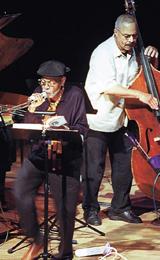
Amiri Baraka and Wilbur Morris
Finland, 2001
|
It was challenging to meet and interview this icon who had an early impact on me beginning in my late teens (but not the similarities of our names!). I have always been an artist who walked different avenues: through The Souls of Black Folk, and later my own show, Black Air, I had a forum and audience for everything concerning events in Africa and the African Diaspora, from covering Oakland’s African Liberation Day (the largest of all the nationwide ALD gatherings being held then) to the astrology of Martin Luther King, Jr.; I was a mixed media sculptor, a carver of wood and stone, and an occult artist, an astrologer who had done a few thousand charts, read tarot, and practiced other oracular and divination techniques.
|
In the following I am presenting excerpts from both interviews, with summaries of some of them for the sake of any technical glitches; some of the summaries are for parts that I did not include here.
The first interview was conducted on August 13, 1974. I went to Newark at the Congress of African People headquarters (CAP). At that time Amiri was approaching 40, and after knowing and being around him these past years, he sounds "young" in this tape! From his analyses and the terminology he used it is now evident that his social perspective was based on Marxist ideology way before the media claims that he announced his “conversion.”
He made clear distinctions between what he felt that black people needed and what he saw compromising black leaders not doing, “progressives” and mainstream alike. He can be heard occasionally thumping the table as he speaks. Of all the things that he said in the interview, the one that stayed entrenched in my memory for decades but is hardly audible in the tape, was his response to my opening question “How you doin’?” “Genuine," was his answer.
So true: in a one-word response he described what and who he was in a unique and powerful way. Here are excerpts and summaries of that interview:
I opened with questions about the 6-PAC. He said that they took the position that Pan Africansim could not be separated from the international class struggle or from the struggle for international socialism throughout the world. And he discussed the difference of focus between the previous Pan African Congress held in 1945, which was anti-imperialist and anti-colonialist, and the 6-PAC's addition of anti-neocolonialism, which reflected the current challenges that Africa faced.
He drew distinctions between progressive and neo-colonial African and Caribbean governments and neocolonial governments who were selling their autonomy for the corporate gains of multinationals. No “progressives” attended the 6-PAC from the English-speaking Caribbean, and the United States government tried to prevent US progressives from attending, but the Tanzanian government, who was the host, put a block on those machinations.
Quicktime Player is being used, and some computers or browsers may not work as well as others, or it may take a while for the bars to move far enough to hear a segment. If you have any problems, please contact me: contact:info@thenewtimesholler.com |
When we discussed Kawaida Towers, CAP's housing project, he became enlivened as he described the situation from a socialistic perspective:
|
He bemoaned the incarceration of Ron Karenga, which had gone into its 3rd year and the conflicts between US and the Panthers. He felt there must be some kind of conspiracy to keep him locked up.
Even though the assassinations of Malcolm, Martin, Medgar Evers, and the destruction of the Panthers were lethal setbacks, he felt that the ensuing awareness and dialectics as a result of those tragedies led blacks to a more progressive consciousness during the 70s than that of the 60s.
|
RON KARENGA, HOW THE SETBACKS OF THE 60s BENEFITED THE POLITICAL AWARENESS OF THE 70s Length: 7' 26"
|
Amiri Baraka slammed “bourgeois democracy,” and faulted some black leaders for being more concerned with their positions and not creating programs that helped black people, like Mayor Kenneth Gibson of Newark, Charles Diggs, or for embracing Republicans,
like Shirley Chisholm who told blacks to vote for Gerald Ford. He said that if a revolutionary becomes mayor, his goal should not be merely to obtain that position, but to use it to push for new programs that benefit people. It would be a revolutionary necessity to form coalitions with progressives of other races and communities. Note that his son Ras, currently a Newark City Councilman and a high school principal, who was 4 at the time of the interview, is now running for mayor there.
|
In answer to my question about the role of the artist in the struggle, Amiri Baraka thought that it could be of great use but many artists have a bourgeois background and concept of what art is and that an artist should use their work to raise the consciousness of the people.
I mentioned it had been said he should write a new US national anthem, and that James Brown should do the music, he chuckled slightly:
|
|
Concerning the “new’ religions and alternative forms of spirituality that blacks were getting into from the Yoruba religion to astrology, Amiri Baraka felt those pursuits’ influences would largely be negative.
Especially for intellectuals it represents a real lack of “clarity,” because religion is a diversion, that the material world will raise the spiritual. He understood religion because he had “come out of the spiritual,” and that CAP was about going beyond the metaphysical.
More people can be united around material concerns than religion. Religion at best is a secondary concern, and that we should make our struggle a material struggle, and take it away from metaphysical references. Of course I had my ideas about this that were different than his, being an astrologer,
but as an interviewer I was more interested in what he thought:
|
Other topics that we discussed but are not among these segments of the interviews were: The Newark Cab Drivers Association had been formed with the purpose of creating a union for the cab drivers. The whole concept of this was clearly socialist, with the idea that workers such as the cab drivers had to be engaged class struggle.
About writing projects; when I asked him if he was working on any new plays he said: “I’ve just finished working on a novel,” but he understands the publisher “Don’t like it;” he completed a book about Newark that’s supposed to come out that year published by Howard University Press; a book of essays that CAP is putting out; they worked on some of his earlier plays, and a new play about Mayor Gibson that was done that year; “And I have to write another play soon…”
|
|
AMIRI BARAKA: AN EVOLUTIONARY AND A REVOLUTIONARY
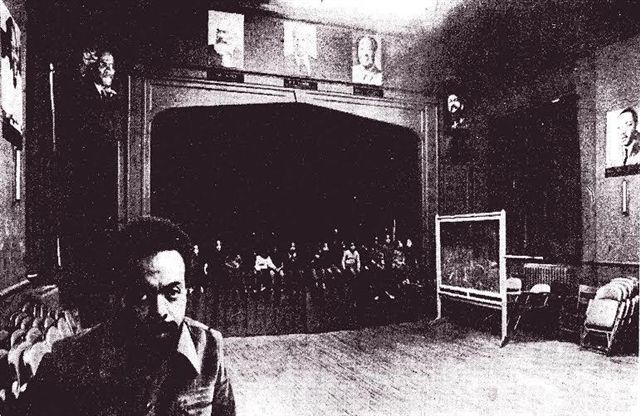
The New York Times/Edward Hausner
|
This photo appeared in the New York Times article, Baraka Abandons 'Racism' as Ineffective And Shifts to 'Scientific Socialism' of Marx It was taken at the Congress of African People in Newark.
It is interesting that images of Marx, Lenin, and Mao are center and above the stage with images of African American leaders (the left figure is unidentifiable), Malcolm X, Amiri on the right, with Martin Luther King at the far right are to the side and underneath them.
|
|
HOME
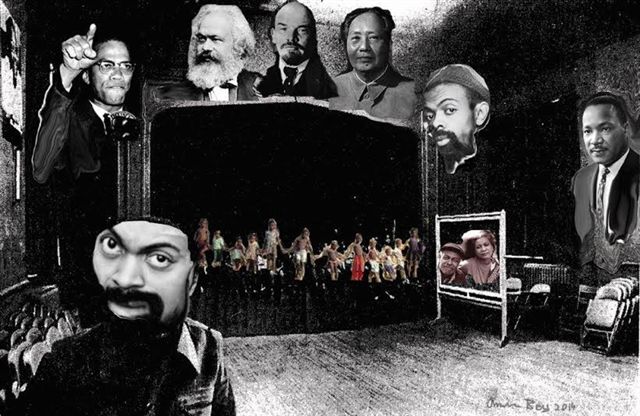
I Hollered this from the New York Times image. (c) Amir Bey, 2014
|
Later that year he renounced Black Nationalism, and in a December 27th New York Times article by Joseph F. Sullivan titled, Baraka Abandons ‘Racism’ as Ineffective and Shifts to ‘Scientific Socialism’ of Marx, he stated that Black Nationalism was too narrow to resolve the issues facing the black community.
The Souls of Black Folk's collective’s name was now The Splibs. (Splib is 1950s-60s Mid-western black jargon for African-American, not found in other parts of Africa-America) We had fought the station and succeeded in our struggle for self determination in the media by forming a separate department from the Public Affairs Department.
Kunle Mwanga, founder of Earth Art Productions, a cultural activist and music producer and I decided to put together a 4–hour retrospective on Amiri.
I conducted my second interview by phone with Amiri on January 24th, 1975.
The show, broadcast on January 26, also included a radio production of The Dutchman and readings of his poetry and essays by performers living in the San Francisco Bay Area. Here are excerpts from the second interview:
|
"What the article is trying to do is pretend that everything we've been doing for the last 10 years, what we've just said is totally nonsense... What we've said is that as far as ideologically we've developed very definitely to commit ourselves to scientific socialism;
that's without a doubt. But at the same time we've tried to make it clear that the reason why we are doing that is because we are committed to the black liberation struggle..."
|
AMIRI BARAKA'S DIFFERENCES WITH DON L. LEE/HAKI MADHUBUTI AND JITU WEUSI Length: 4' 22"
|
Amiri and Haki, writer and the publisher and founder of 3rd World Press, later patched things up, collaborating on several projects throughout the years.
However, here Amiri's comments are fresh and intense concerning the differences between him and some black leaders at that time.
|
ON CONTROL OF BLACK MUSIC Length: 2' 22"
|
|
|
BLACK ELECTED OFFICIALS
AND THE POSSIBILITY OF A BLACK PRESIDENT Length: 7' 08"
|
Socialist that he was, Amiri Baraka supported President Obama in both elections.
From his comments here he sees the possibility of a viable alternative presidential candidate, naming Congressman Ron Dellums of Oakland, CA.
|
~SOME REFLECTIONS~
How does one pay a tribute to Amiri Baraka? As I read his work, go over his life and think about his multi-layers of hip, anger, erudition, love, and humanisim, his love and documentation of black music and culture through essay, and story, his collaborations with many musicians and other poets, and dancers, and his fight for justice, it will take the whole community of "cultural workers." So please accept these few observations given with the idea that they are one of many more coming from others. The best homage is to read and thereby experience his thought.
|
|
|
1967 NEWARK RIOTS
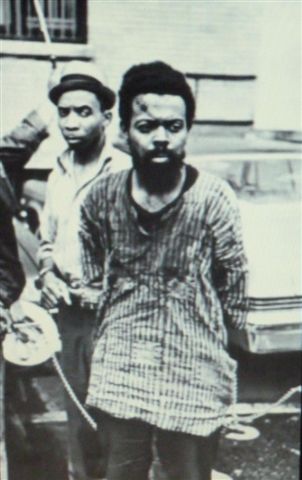
|
On several occasions Amiri exhibited moral and physical courage. "They" attacked Amiri a number of times. The injuries he sustained during the Newark riots in 1967 is well documented by the photograph above of his face and clothes covered with blood.
The above photo was taken during the Newark riots; the wound left a permanent scar on Amir's face,
slightly visible on the photo on the right. Another time "they" went into his house to get him.
|
A WARRIOR'S WOUND
| |
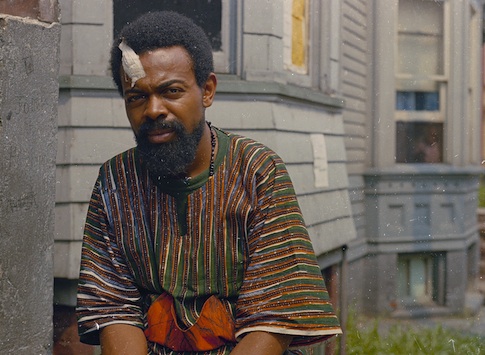
Amiri Baraka/AP
|
|
|
|
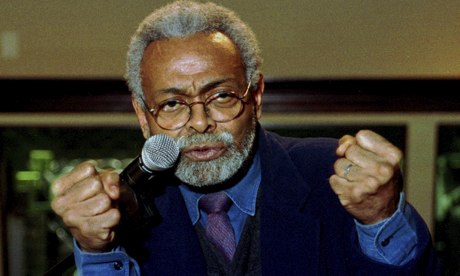
Robert Abbot Sengstadler/Getty Images
Two-fisted Writer
|
In late August, 1979, a young Puerto Rican, Luis Baez, a teen who had a known history of aberrant behavior was shot 21 times by at least five officers. On the day he was killed his mother called the police for help because he had been waving a pair of scissors around. The officers arrived and Baez leaped or fell from the fire escape into a yard. Police officers claimed that he had a knife, so they emptied their revolvers into his frail body. No one was punished for this crime, and there was a large demonstration held in Brooklyn, where I saw Amiri and his wife Amina marching.
The local media were in full force. However, after the Sun set and the media packed up their vans and left, the police began running their cars into the crowd of mainly African American demonstrators. The demonstrators responded with bottles and rocks thrown with unerring accuracy that bounced off of the reinforced windows of the police cars. Small pieces of broken glass sparkled in the streets like diamonds as the police jumped out of their cars swinging their nightsticks beating people, not even bothering to make arrests in some cases, just leaving them in the street. The large body of demonstrators broke up into small groups that became so terrorized that in trying to escape some ran into what they thought were the lobbies of apartment buildings, only to realize that they had burst into residents’ homes! Any door was a place of refuge, and a group that I was in ran into a neighborhood joint where folks were playing pool. Nobody asked any of those groups why they were there or asked them to leave. When the havoc started to subside, I ran into my brother, Nicholas M. Cherot, Esq., who was a legal observer attending the demonstration, and as we were standing in a driveway, a police car suddenly drove up on us fast. We just stood there and looked at them instead of running so as not to provoke them, the way you're careful when confronted with an angry bear in a secluded forest, except they were like Nazis with those NYPD helmets. The baby-face cop riding shotgun gave us a toothy grin, nodding his head as he smacked the palm of his hand with his night stick.
|
|
AMIRI AND AMINA BARAKA
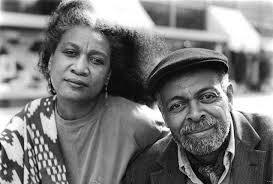
|
The beginning of the police onslaught was the last time I saw Amiri and Amina that night. A few days later I ran into him at the Tin Palace, where we talked about how the police waited for the media to leave before provoking the crowd.
I wonder where and how he extricated himself and Amina from that violence, shrewd Trickster that he was. A week later there was a September 6 New York Times article Federal Inquiry on Police Action at Protest Urged; Brutality Alleged at Rally After Brooklyn Killing; Training Review Ordered; 'Corrective Remedies' Sought. Sound familiar?
|
AMIRI PRESIDING
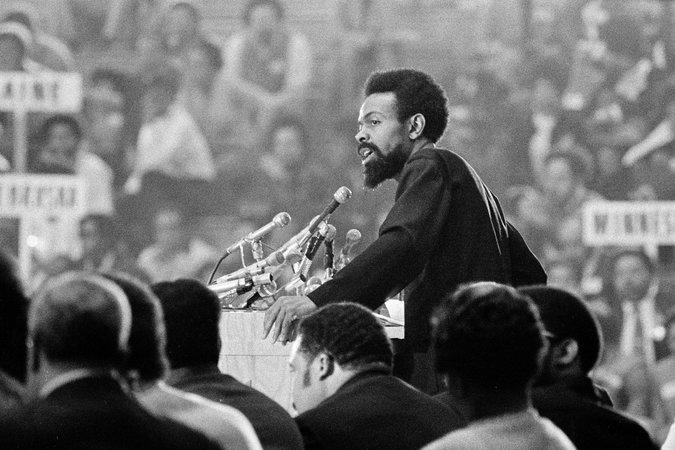
Gary Settle/New York Times
It has been said that he held the convention together.
|
To observe Amiri Baraka’s trajectory as a writer and activist is to see a personal evolution whose every stage generated a corresponding rise in artistic and social consciousness for those inspired by him, or reactions ranging from apprehensive to vehement.
He called himself a revolutionary humanist who said that “The good guys - the people - are going to win.”
A prolific writer: his probing essays, absorbing short stories, and often tragicomical plays documented not only African American culture and the racial divide in the US, but the deep inner turmoil of individuals wrestling with identity conflicts, as with his 1967 play The Toilet, about two black and white high school boys secretly in love with each other. His intensity of purpose, courage, and organizing ability displayed itself throughout his life,
from the masterful way he presided over the National Black Political Convention in 1972 held in Gary, Indiana, to his battles with police, and fights with Newark’s City Hall. His insights could have lethal effects on presupposed notions, yet he also had a playful sense of humor that revealed a Trickster with an underlying humor that laced his keen observations of the human condition.
Like Malcolm, another Evolutionary, Amiri Baraka's activism and presence in the black movement laid foundations whose profound role in world consciousness when recognized is often experienced as a revelation. Their viewpoints were broadened by their exposure to and their incorporation of internationalist perspectives, thereby raising the ire of confused colleagues and alarming their powerful adversaries. A difference was Malcolm’s transformations had a religious component because of his embrace of Islam, while Amiri, who had been a Muslim at one time, in the above segment on the "New Spirituality," spoke against the “distractions” of religion for black intellectuals.
|
There is an irony in an artist like Amiri Baraka being a socialist considering his pronounced individuality, which is quite different from the art and personalities that come from most socialistic societies. They are under relative constraints as to what is politically acceptable art, and much of its variety has been encumbered by the criteria of the role of art. Cuba is an exception to that with its beautiful, expressive Afro-Caribbean art, like the artist Manuel Mendive, but for the most part, the individual freedoms, along with "bourgeios" material necessities, is not possible there. Amiri's individual growth and the freedom that he asserted
to define himself over the years like few other artists anywhere, was due to the capacity, material and social, that exists only in a capitalist society. The New York City metropolitan area, a city-state with a cosmopolitan character and international position, has vast expanses of diverse audiences and communities such as Harlem the cultural Mecca of the African Diaspora, Greenwich and East Villages, museums, galleries, Jazz and theater venues, where he made great impact and was active in wide circles of collaborations.
|
I want to thank Ben Young and the studios of WKCR-FM and bass player Albey Balgochian for their assistance in transferring the original reel-to-reels into wav format.
|
|
Amir Bey
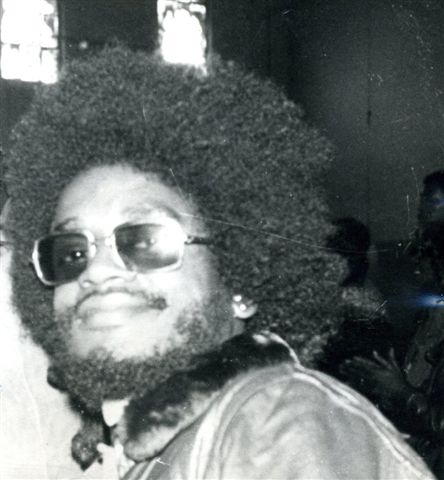
@ A February 21, 1975
Rally for
Malcolm's 10th
Oakland, CA
|
|
|
| | |